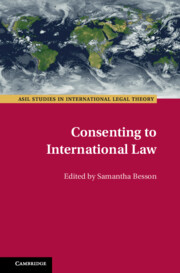Book contents
- Consenting to International Law
- ASIL Studies in International Legal Theory
- Consenting to International Law
- Copyright page
- Contents
- Contributors
- Preface
- Consenting to International Law
- Part I Notions and Roles of Consent
- 1 Consenting Is Not Willing
- 2 State Consent and the Legitimacy of International Law
- 3 Controlling Consent
- 4 International Organizations and the Disaggregation of Consent
- 5 Consenting to International Law in Five Moves
- Part II Objects and Types of Consent
- Part III Subjects and Institutions of Consent
- Index
5 - Consenting to International Law in Five Moves
from Part I - Notions and Roles of Consent
Published online by Cambridge University Press: 23 November 2023
- Consenting to International Law
- ASIL Studies in International Legal Theory
- Consenting to International Law
- Copyright page
- Contents
- Contributors
- Preface
- Consenting to International Law
- Part I Notions and Roles of Consent
- 1 Consenting Is Not Willing
- 2 State Consent and the Legitimacy of International Law
- 3 Controlling Consent
- 4 International Organizations and the Disaggregation of Consent
- 5 Consenting to International Law in Five Moves
- Part II Objects and Types of Consent
- Part III Subjects and Institutions of Consent
- Index
Summary
The author seeks to unpack five of the main discursive moves witnessed in the literature and case law pertaining to the question of consent to international law. He argues that these five specific discursive moves are performed by almost anyone engaging with the question of consent to international law, be such engagement on the more orthodox side or on the more critical side of the argumentative spectrum. The author claims that these five discursive moves correspond to the reproduction of a very modernist understanding of authority, the constitution of the very subject that is consenting, the anonymization of the author of consent, the reversal of the temporality of the legal discourse on consent and the adoption of very binary patterns of thought. This chapter shows that discursive moves made by international lawyers around the idea of consent bears heavily upon the type of political legitimacy, the type of geography, the type of responsibility, the type of temporality, and the type of hermeneutics that international law is serving.
Keywords
- Type
- Chapter
- Information
- Consenting to International Law , pp. 117 - 134Publisher: Cambridge University PressPrint publication year: 2023

